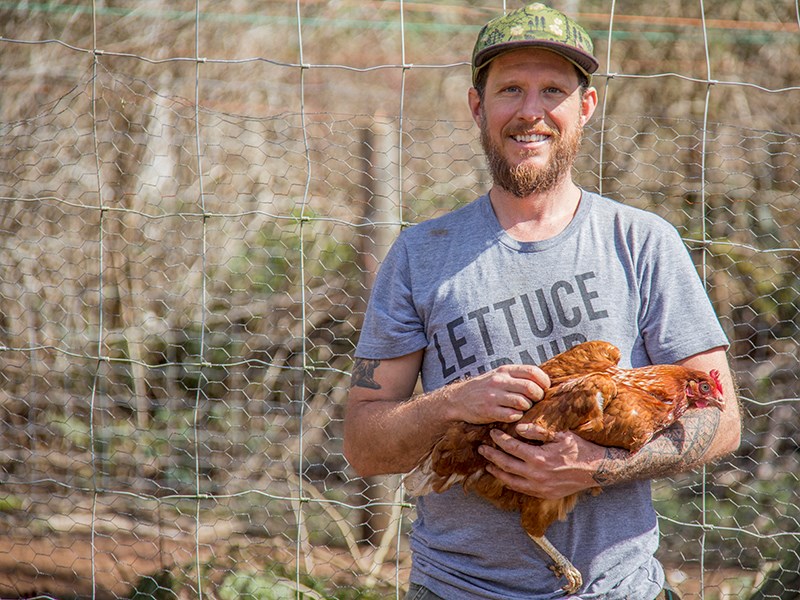Two organizations that represent farmers in the Powell River area have, for the most part, overcome their differences and are planning on getting back together.
There were years that the Powell River and District Agricultural Association (PRDAA) and the Powell River Farmers’ Institute (PRFI) were at odds, so much so that the PRDAA split from the PRFI.
“We’ll call it local politics. Or how about in-fighting?” joked Alan Rebane, PRFI president for the last three years. Rebane owns Creekside Farm, a livestock farm in Paradise Valley.
“It’s a small town and somebody didn’t see eye to eye with the other person,” said Rebane.
When he joined PRFI about five years ago, Rebane admitted he found it shocking that there was still bitterness between the two sides.
The institute was founded 101 years ago and is the oldest of the two organizations. The agricultural association began in 1933.
According to Gary de Casmaker, new PRDAA president who also operates Eternal Seed and Garden Centre, nobody has been able to enlighten him as to why it was necessary to have two organizations in the first place.
“We know that in the past there was some bad blood,” said de Casmaker. “The two organizations have been in opposition for some time and never were able to get their act together.”
For the most part, the two groups are now seeing eye to eye and are taking steps toward amalgamation. The big reason is both organizations are faced with the same problem many community non-profit societies in Powell River confront: not enough volunteers to go around.
“Volunteerism is a strange thing,” said de Casmaker. “There’s a lot more work required than there are volunteers to do it.”
The makeup of the existing boards of directors for the PRDAA and the PRFI shows a lot of overlap.
“We end up with pretty much the same people running both organizations,” said de Casmaker. “I would say 50 per cent of each organization’s board is a member of the other organization’s board.”
One of the new farmers in the region is Rob Gilchrist, who moved to Powell River in 2008. Gilchrist owns Funky Beets Farm south of town and is a member of the PRDAA and PRFI.
“In an ideal world, I’m a stakeholder so it’s important to me to maintain some sort of involvement with associations,” said Gilchrist. “I can’t just put my head down and farm blindly without making a contribution back to my community, because I think the two things need each other in order to survive.”
A similar survival instinct is behind the merger of PRDAA and PRFI. The institute started talking about an amalgamation three years ago. The agricultural association took the idea to its members within the last year and the hope is to have the merger completed by this summer.
The new BC Societies Act is expected to come into effect in November and that is placing a sense of urgency on the amalgamation between the two agricultural societies.
If the PRDAA were to remain its own entity, it would have to change its constitution and bylaws in accordance with the new act. However, because the PRFI is governed under different provincial legislation, the Farmers and Womens Institutes Act, the new amalgamated farmers’ organization would be under the auspices of that act.
“If this merger can be accomplished before November, then we can avoid that major hurdle,” said de Casmaker.
Rebane and de Casmaker said they hope the amalgamation of the two organizations will benefit Powell River farmers such as Gilchrist. Gilchrist agreed the joining of the regions’ two farming organizations is a good thing.
“Farming is harder than I thought it would be, but it’s getting less difficult now. I was fantasizing about farming more than I was thinking about it as a career choice,” he said. “The more people are together, that can strengthen our voice.”
That voice could also be made stronger with more money. PRFI has $80,000 in the bank that, according to Rebane, has been sitting there for 20 years.
PRDAA sees an opportunity to invest those funds in the agricultural grounds and buildings, which it owns and operates with revenue primarily from the Powell River Open Air Market, said de Casmaker.
“That’s a real farmers’ kind of solution,” said de Casmaker. “I’ve got money. I’ve got land. Let’s play.”
Some members of the PRFI don’t see it that way, however.
“That is a way a lot of them look at it, which bothers me a little bit,” said Rebane. “Some look at it as they’ve got the land that we could do stuff with, and the others look at it as they’ve got the money. We want some of that money. Some of the old guard still thinks some of that money should be part of the agricultural association.”
Rebane has a hard time justifying hanging onto that money and still being a society, even though the farmers institute is governed under legislation that allows it to make a profit. He said the agricultural grounds and the farmers markets are good investments. Young farmers are, too.
“The farmers institute should be an arm that helps distribute money to young farmers,” said Rebane. “I’m fully in favour of that.”
Despite some grumblings from members on both sides, there is not much opposition to the planned amalgamation.
“Not yet, so far,” said de Casmaker. “Everyone seems to be interested and in favour, but put any three farmers in a room and you’re going to get three different opinions.”



